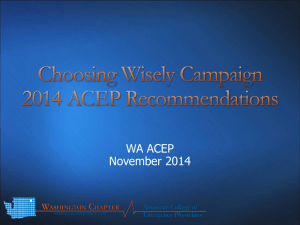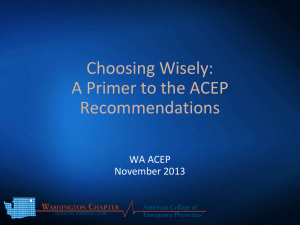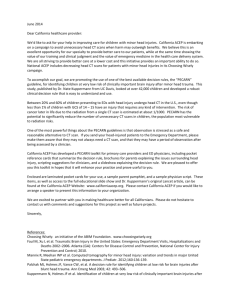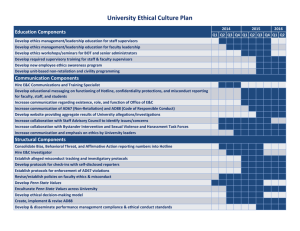Ethical Violations by Non-ACEP Members
advertisement
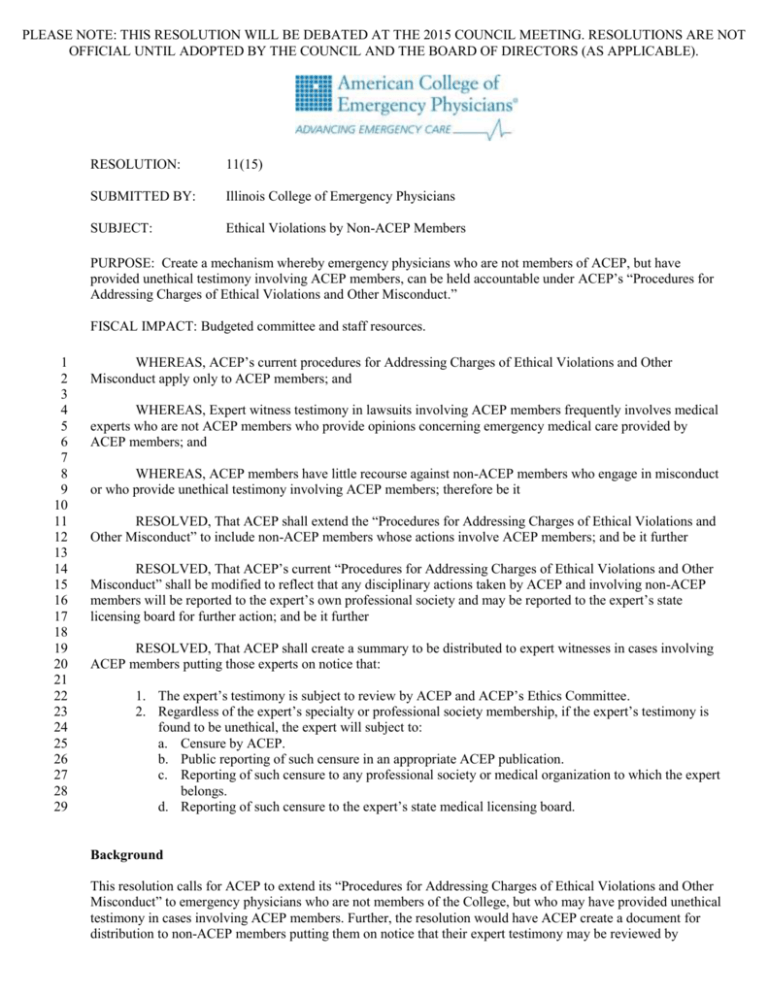
PLEASE NOTE: THIS RESOLUTION WILL BE DEBATED AT THE 2015 COUNCIL MEETING. RESOLUTIONS ARE NOT OFFICIAL UNTIL ADOPTED BY THE COUNCIL AND THE BOARD OF DIRECTORS (AS APPLICABLE). RESOLUTION: 11(15) SUBMITTED BY: Illinois College of Emergency Physicians SUBJECT: Ethical Violations by Non-ACEP Members PURPOSE: Create a mechanism whereby emergency physicians who are not members of ACEP, but have provided unethical testimony involving ACEP members, can be held accountable under ACEP’s “Procedures for Addressing Charges of Ethical Violations and Other Misconduct.” FISCAL IMPACT: Budgeted committee and staff resources. 1 2 3 4 5 6 7 8 9 10 11 12 13 14 15 16 17 18 19 20 21 22 23 24 25 26 27 28 29 WHEREAS, ACEP’s current procedures for Addressing Charges of Ethical Violations and Other Misconduct apply only to ACEP members; and WHEREAS, Expert witness testimony in lawsuits involving ACEP members frequently involves medical experts who are not ACEP members who provide opinions concerning emergency medical care provided by ACEP members; and WHEREAS, ACEP members have little recourse against non-ACEP members who engage in misconduct or who provide unethical testimony involving ACEP members; therefore be it RESOLVED, That ACEP shall extend the “Procedures for Addressing Charges of Ethical Violations and Other Misconduct” to include non-ACEP members whose actions involve ACEP members; and be it further RESOLVED, That ACEP’s current “Procedures for Addressing Charges of Ethical Violations and Other Misconduct” shall be modified to reflect that any disciplinary actions taken by ACEP and involving non-ACEP members will be reported to the expert’s own professional society and may be reported to the expert’s state licensing board for further action; and be it further RESOLVED, That ACEP shall create a summary to be distributed to expert witnesses in cases involving ACEP members putting those experts on notice that: 1. The expert’s testimony is subject to review by ACEP and ACEP’s Ethics Committee. 2. Regardless of the expert’s specialty or professional society membership, if the expert’s testimony is found to be unethical, the expert will subject to: a. Censure by ACEP. b. Public reporting of such censure in an appropriate ACEP publication. c. Reporting of such censure to any professional society or medical organization to which the expert belongs. d. Reporting of such censure to the expert’s state medical licensing board. Background This resolution calls for ACEP to extend its “Procedures for Addressing Charges of Ethical Violations and Other Misconduct” to emergency physicians who are not members of the College, but who may have provided unethical testimony in cases involving ACEP members. Further, the resolution would have ACEP create a document for distribution to non-ACEP members putting them on notice that their expert testimony may be reviewed by Resolution 11(15) Ethical Violations by Non-ACEP Members Page 2 ACEP’s Ethics Committee and, if found to be unethical, the expert would be subject to public censure by ACEP, as well as a report being filed with the expert’s professional society, medical organization, and the expert’s state medical licensing board. ACEP developed its “Procedures for Addressing Charges of Ethics Violations and Other Misconduct” (“Procedures”) in 1997 to provide a mechanism by which an ACEP member could file a complaint against another member for egregious or unethical expert testimony given in a lawsuit. The Procedures were crafted carefully to ensure compliance with the Health Care Quality Improvement Act (HCQIA), which provides immunity for ACEP members, volunteers, and staff involved in the investigations of these complaints when its strict rules regarding due process and hearing requirements are followed. Other medical societies also follow the rules for disciplinary action taken against their members as set forth by the HCQIA, and research shows that these societies also do not extend such discipline to non-members. The issue of holding non-ACEP members accountable for their unethical expert testimony has been discussed by the Council and the Board of Directors in reference to its adoption of Amended Resolution 22(06) Egregious Testimony regarding publication of the names of members judged to have provided unethical testimony. As a professional association, the only leverage available to ACEP regarding an ethics violation is the potential termination of membership status of its members. Non-members are not governed by the College’s policies and procedures, and it is unlikely that a non-member would subject him/herself to this process as the result of the filing of an ethics charge. Subjecting non-members to its policies and procedures cannot be done unilaterally by ACEP. The College has instituted a procedure, through the Standard of Care Review Panel, by which an expert’s testimony, whether the expert is a member of ACEP or not, can be reviewed and deemed below the standard of care in its Procedure for Review of Testimony Regarding Standard of Care in Emergency Medicine. While no formal disciplinary action is taken, and the expert’s identifying information is redacted from the final, published document, these reviews of such improper or unethical testimony are educational in nature and can be an alternative mechanism for deeming an expert’s testimony egregious. The Standard of Care Review Panel’s determination can be developed into an article for ACEP Now and is used solely for educational purposes to establish the actual standard of care. ACEP Strategic Plan Reference Achieve meaningful liability reform on the state and federal level. Fiscal Impact Budgeted committee and staff resources. Prior Council Action Resolution 12(13) Procedures for Addressing Charges of Ethical Violations and Other Misconduct adopted. The resolution amended by substitution the ethics procedures in the College Manual. The changes addressed issues relating to timeliness, review requirements, membership status, and clarifications of the scope and disclosure of disciplinary actions. Resolution 11 (10) Procedures for Addressing Charges of Ethical Violations and Other Misconduct adopted. The resolution amended by substitution the ethics procedures in the College Manual. The changes addressed issues relating to deadlines and provided mechanisms in the event that the number of Board recusals impacts the Board’s ability to act on ethics complaints. Resolution 14 (07) Procedures for Addressing Charges of Ethical Violations and Other Misconduct adopted. The resolution amended by substitution the ethics procedures in the College Manual. The changes addressed issues relating to due process and the hearing procedures. Resolution 11(15) Ethical Violations by Non-ACEP Members Page 3 Amended Resolution 22(06) Egregious Testimony adopted. The resolution directed that ACEP publicize the names of members receiving public censure, suspension, or expulsion as a result of having been found to give egregious expert witness testimony develop a process for notifying the appropriate specialty society or licensing board when an episode of alleged egregious testimony by any individual testifying as an expert in emergency medicine is identified. Resolution 35 (04) Procedures for Addressing Ethics and Other Disciplinary Charges adopted. The resolution amended by substitution the ethics procedures in the College Manual. The changes related to the categories of sanctions and clarifying when disclosure of such sanctions may be appropriate or necessary. Amended Resolution 1(01) Procedures for Addressing Ethics and Other Disciplinary Charges adopted. The resolution amended by substitution the ethics procedures in the College Manual. The changes included enhancements related to communications, responsibilities, timelines, and voting. Resolution 5(99) College Manual adopted that included Procedures for Addressing Ethics and Other Disciplinary Charges. The resolution established the College Manual and defined the method for amending it. Prior Board Action Resolution 12(13) Procedures for Addressing Charges of Ethical Violations and Other Misconduct adopted. June 2013, reviewed the proposed changes to the Procedures for Addressing Charges of Ethical Violations and Other Misconduct and approved submitting a College Manual resolution to the 2013 Council. Resolution 11(10) Procedures for Addressing Charges of Ethical Violations and Other Misconduct adopted. April 2010, reviewed the proposed changes to the Procedures for Addressing Ethics and Other Disciplinary Charges and approved submitting a College Manual resolution to the 2010 Council. Resolution 14 (07) Procedures for Addressing Charges of Ethical Violations and Other Misconduct adopted. June 2007, reviewed the proposed changes to the Procedures for Addressing Ethics and Other Disciplinary Charges and requested additional changes to be reviewed and approved by the Board. Approved submitting a College Manual resolution to the 2007 Council. Amended Resolution 22(06) Egregious Testimony adopted. Resolution 35 (04) Procedures for Addressing Ethics and Other Disciplinary Charges adopted. January 2004, Standard of Care Review Panel processes and procedures approved. Amended Resolution 1(01) Procedures for Addressing Ethics and Other Disciplinary Charges adopted. Resolution 5(99) College Manual adopted. August 1998 Procedure for Addressing Ethics Charges adopted. Background Information Prepared by: Leslie Patterson Moore, JD General Counsel Reviewed By: Kevin Klauer, DO, EJD, FACEP, Speaker James Cusick, MD, FACEP, Vice Speaker Dean Wilkerson, JD, MBA, CAE, Council Secretary and Executive Director


